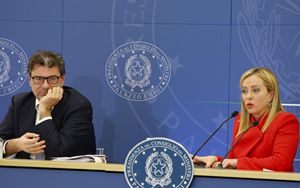(Finance) – The spotlight is back on the bond marketwhere persistent ones are of concern tensions on BTP yields and the widening of the spread. This morning the performance of the Ten-year BTPs Italians went further at 4.92%, pushing it Spread at 203 points, compared to a 10-year Bund yield of 2.89%. The prospect of the ECB maintaining high rates for longer has also given wings to the longest thirty-year maturity, which has already broken through the 5% threshold for the first time since 2007.
A movement that seems to ignore the continuations reassurances of the Premier Giorgia Meloni and the Minister of Economy Giancarlo Giorgettiwho just yesterday said he had a meeting with the rating agencies, to “clarify” on what the Government’s next choices will be and “to demonstrate the credibility and solidity of the country”.
“We are called to make choices and the preparation of budget law it is the moment of choice par excellence”, explained Giorgetti, anticipating that the government wants “use available margins of public finance – he underlined – to adopt measures capable of stimulating the real economy”.
Despite this, resounding rejections came from the foreign press for the Meloni Government. “Meloni didn’t realize how her spending plans now appear unsustainable”, is the harsh comment of theEconomist after Nadefwhich offers a worsening picture of the economic situation of our country and of public finances.
No less Bloombergwhich rejects the Meloni government and speaks of “risks that haunt bond investors”. The financial newspaper recalls that Italy “is only classified one notch above junk level with a negative outlook by Moody’s Investors Service, which is expected to publish its next assessment in November. Italy could also be vulnerable if inflation remains above the ECB’s 2% target, forcing rates to remain high.”
Concern remains high for rating agencies. In fact, the reaction of the markets shows that they have already sensed the risk that the situation could explode. It is true that a spread of 200 points is far from that tragic 2011, when the no-confidence vote against the Berlusconi government brought the spread to 570 points, but it is also true that a brake on the spread is exerted by thecommitment undertaken by the ECB to avoid excessive deviations within the single currency bloc. However, an excessive deviation from the path of public finance adjustment it could cost Italy a “recall” of the EU and the ECB.
But the biggest risk would be that of a further worsening of the spread, capable of persuading one of the rating agencies to punish Italy, bringing the country’s rating below investment grade and significantly worsening the prospects of refinancing the debt in to be.
